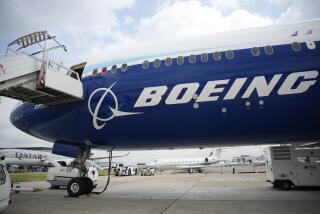Rockwell to Sell Off Space, Defense Divisions to Boeing
- Share via
SEAL BEACH — Rockwell International Corp., shedding the businesses that made it synonymous with the U.S. manned space program, agreed Thursday to sell most of its space and defense operations to Boeing Co. for $3.2 billion.
The deal is the biggest step yet in the effort by Seal Beach-based Rockwell--builder of the space shuttles, the Apollo spacecraft that went to the moon and the B-1 bomber--to shift from aerospace and focus on its commercial markets that offer stronger growth opportunities.
“This is a historic step in the continuing transformation of Rockwell,” Chairman Donald R. Beall said.
Although the public may best know Rockwell from the images of its technicians--in white smocks sporting the blue Rockwell logo--on the launch pad, the company today makes most of its money automating factories and making fax machine modems, semiconductors and automotive components.
At Rockwell’s plants across Southern California, many workers greeted the proposed sale with a sense of resignation because of all the defense industry mergers in recent years. “It’s like baseball. You just change your uniform,” said Darold Cummings, a B-1 bomber specialist in Seal Beach and a 23-year Rockwell veteran.
No layoffs or plant closings are expected for the Rockwell properties after they are purchased, said Jerry King, president of Boeing’s defense and space group.
“We don’t have in our plans any wholesale changes,” King said in an interview, noting there is “minimum overlap” in the operations.
There could be some job cuts as Boeing streamlines things, he said. But because Boeing’s jetliner business is booming, “there’s very likely other career opportunities for them” elsewhere in the company, King said.
The proposed sale will strip Rockwell of most of its Southern California operations, including its 2,900-employee Autonetics and Missile Systems unit in Anaheim and its 1,300-employee North American Aircraft unit in Seal Beach. The company’s Seal Beach campus, which includes its corporate headquarters, will be transferred to Boeing, and Rockwell’s top executives and a support staff of about 700 will have to look for a new building.
Rockwell’s remaining Orange County presence will be its 2,200-employee semiconductor systems unit in Newport Beach, although real estate industry sources say the company is likely to keep its corporate headquarters in the county.
For Boeing, the Rockwell assets would enable the Seattle-based giant to bolster its space and defense group, and enlarge its presence in aerospace well beyond its role as the world’s largest maker of commercial jetliners. Some experts even suggested that Boeing is laying the groundwork for a 21st century marriage between space technology and consumer air travel.
For now, the sale also shows that the rapid consolidation of the U.S. space and defense industry has not run its course. There has been a rash of defense mergers in recent years as contractors adapted to post-Cold War cutbacks in defense budgets and reduced spending by the National Aeronautics and Space Administration.
With fewer contracts available, companies decided that they had to either increase their size via mergers or get out of the business.
The proposed sale would also alter the Southern California aerospace industry, where Rockwell has long been a mainstay.
Most of Rockwell’s space and defense assets--which employ 21,000 people and generate $3 billion of Rockwell’s $13 billion in annual sales--are in Los Angeles and Orange counties. Besides Seal Beach and Anaheim, there are facilities in Canoga Park, Downeyand Palmdale.
The Rockwell deal calls for Rockwell stockholders to receive Boeing stock valued at about $860 million and for Boeing to assume $2.2 billion of Rockwell’s debt. Certain employee retirement liabilities bring the deal’s total value to $3.2 billion.
If completed, the sale would leave Rockwell virtually debt-free, a prospect that cheered Wall Street. Rockwell’s stock surged $2.75 a share, to $55.25, Thursday on the New York Stock Exchange, while Boeing rose 62.5 cents a share to $89.125.
One Wall Street analyst, Byron Callan of Merrill Lynch & Co., said Boeing’s willingness to beef up its space operations is intriguing because it indicates that Boeing sees a possible merging of commercial air travel and space transportation.
“And if they’re laying the foundation for a space company, we’re going to hear more from them” in terms of buying space-related assets, Callan said.
The Rockwell sale was not unexpected. In March, industry sources revealed that Rockwell had put its space and defense lines up for sale.
Rockwell no longer builds space shuttles or B-1 bombers. However, it performs extensive modifications on both. Its Rocketdyne division in Canoga Park also makes engines for the Delta and Atlas expendable rockets, and is working on propulsion systems for the space station. Rockwell also produces defense electronics, navigation satellites and missiles.
In striking the deal with Boeing, Rockwell did retain one aerospace line: its thriving Collins Avionics group, which makes instruments and electronics for aircraft.
But Rockwell has signaled for years that it expected to grow mainly by concentrating on commercial markets, and not on dwindling government contracts.
A decade ago it bought the Allen-Bradley factory automation company, and last year it acquired Reliance Electric--a maker of motors and other automation gear--for $1.6 billion. Rockwell also has invested heavily in its semiconductor and vehicle component segments.
The result: Whereas Rockwell relied on the government for more than 60% of its sales a decade ago, more than 70% now come from its commercial enterprises. Space and defense now account for about one-quarter of Boeing’s annual sales, which totaled $19.5 billion last year, and Boeing is a pivotal player in the space program.
Among other things, Boeing is the prime contractor for the international space station. And by acquiring Rockwell’s assets, Boeing is poised to replace Rockwell as the partner with Lockheed Martin Corp. in United Space Alliance, which plans to take over daily management of the space shuttle program.
Boeing has talked to NASA about the Rockwell deal, and NASA officials “feel very good” about the transfer, King said.
NASA was more cautious, saying it would “of course pay close attention to areas that involve or impact NASA” related to the sale.
Boeing also said it plans to rename the acquired Rockwell assets Boeing North American Inc., a throwback to Rockwell’s predecessor, North American Rockwell, which was created in 1967 with the merger of North American Aviation and Rockwell-Standard Corp.
The deal is subject to, among other things, approval by Rockwell stockholders. It is expected to be completed in mid-November.
Contributing to this story were Times staff writers John O’Dell and Marla Dickerson in Orange County and Barry Stavro in the San Fernando Valley.
* ROCKWELL METAMORPHOSIS: The change to the commercial conglomerate brings Rockwell full circle. D1
* EMPLOYEE REACTION: Seal Beach workers unfazed by prospect of new ownership. D1
More to Read
Inside the business of entertainment
The Wide Shot brings you news, analysis and insights on everything from streaming wars to production — and what it all means for the future.
You may occasionally receive promotional content from the Los Angeles Times.










